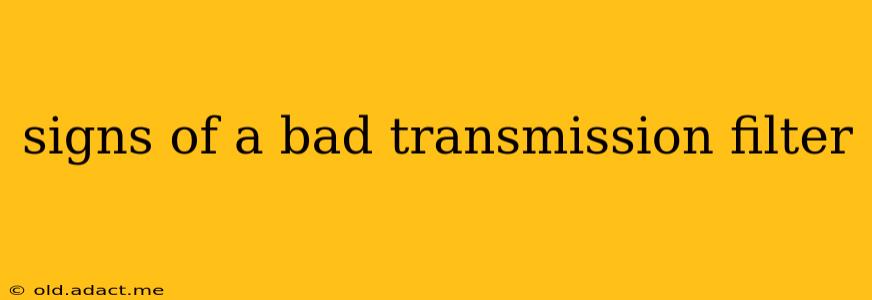A failing transmission filter can lead to significant problems with your vehicle's automatic transmission, resulting in costly repairs down the line. Understanding the warning signs is crucial for proactive maintenance and preventing major breakdowns. This comprehensive guide will cover the key indicators that your transmission filter needs replacing, along with frequently asked questions to help you better understand this critical component.
What Does a Transmission Filter Do?
Before diving into the signs of a failing filter, let's briefly understand its function. The transmission filter, also known as the transmission strainer, is a crucial part of your vehicle's automatic transmission system. It acts as a barrier, preventing debris like metal shavings, clutch material, and other contaminants from circulating within the transmission fluid. This prevents damage to vital transmission components, ensuring smooth shifting and extending the life of the transmission itself.
Common Signs of a Bad Transmission Filter
Several symptoms can indicate that your transmission filter is failing or clogged. These signs often overlap with other transmission issues, so it's crucial to have a professional diagnosis if you experience any of these:
1. Rough Shifting or Slipping Gears
One of the most common signs is difficulty shifting gears. You might experience harsh shifts, delayed engagement, or the transmission slipping out of gear. This is because the clogged filter restricts fluid flow, causing inconsistent pressure within the transmission.
2. Transmission Fluid Issues
A faulty filter often leads to problems with the transmission fluid itself. You might notice:
- Dark or burnt-smelling transmission fluid: This indicates that the fluid is contaminated with debris and is not being properly filtered.
- Low transmission fluid levels: A severely clogged filter can restrict fluid flow, leading to leakage or a false reading on the dipstick.
3. Unusual Noises from the Transmission
As the filter clogs, the transmission may begin to make unusual noises, such as whining, humming, or grinding sounds. This points to internal damage caused by insufficient lubrication due to restricted fluid flow.
4. Overheating Transmission
A clogged filter can restrict fluid flow, reducing its ability to dissipate heat generated during operation. This can lead to transmission overheating, potentially resulting in significant damage. Your vehicle's temperature gauge might indicate overheating or you might even see steam emanating from the transmission area.
5. Check Engine Light Illuminated
While not always directly indicative of a bad filter, a check engine light accompanied by other transmission symptoms should prompt immediate investigation. A diagnostic scan can help pinpoint the cause, which may include a failing filter.
Frequently Asked Questions (FAQs)
Here are answers to common questions regarding transmission filters:
How Often Should I Replace My Transmission Filter?
Transmission filter replacement intervals vary depending on the vehicle make and model. Consulting your owner's manual is crucial. However, a good rule of thumb is to replace it during every major transmission service, which is often around every 30,000-60,000 miles, or as recommended by your vehicle manufacturer.
Can I Replace the Transmission Filter Myself?
Replacing a transmission filter can be challenging and requires specialized knowledge and tools. Unless you have significant automotive experience, it's best to have this service performed by a qualified mechanic. Improper installation can lead to further damage to your transmission.
How Much Does Transmission Filter Replacement Cost?
The cost varies depending on your vehicle, labor rates in your area, and the complexity of the procedure. Expect to pay anywhere from a few hundred dollars to several hundred dollars for parts and labor. This is significantly less than the cost of a major transmission repair or replacement.
What Happens If I Don't Replace a Bad Transmission Filter?
Ignoring a failing transmission filter can cause irreparable damage to your vehicle's transmission. The lack of proper filtration will lead to contaminated fluid causing premature wear and tear on internal components. Ultimately, this will result in expensive transmission repairs or even a complete transmission replacement.
Conclusion
Regular maintenance, including transmission filter replacement, is critical for extending the lifespan of your vehicle's automatic transmission. Paying attention to the warning signs discussed above can save you considerable time and money in the long run. If you experience any of these symptoms, consult a qualified mechanic for diagnosis and repair. Proactive maintenance is always the best approach when it comes to your vehicle's health and longevity.
